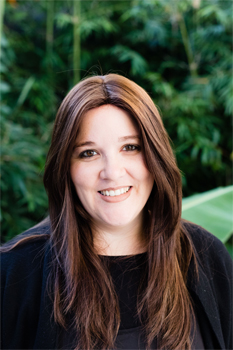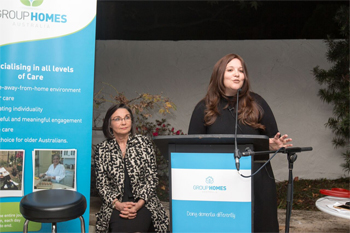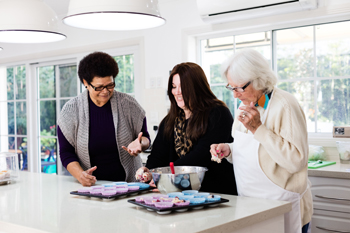Tamar Krebs Group Homes Australia Interview

Tamar Krebs Group Homes Australia Interview
Group Homes Australia offers an innovative model of care for people living with dementia. In late 2015, Group Homes Australia engaged Alzheimer's Australia NSW to benchmark their practice against the Moving Into Care project results.
Group Homes Australia wanted to find out how their method compared with the traditional, residential aged care model.
The findings of the study proved that Group Homes Australia ranked well above industry benchmarks. The organisation focuses on non-institutional way of living and emphasises residents abilities rather than their disabilities. Each resident receives customised care.
The study benchmarked 5 homes against 80 residential aged care providers across NSW and ACT.
The research highlighted the following:
Care:
Respondents reported a warm, compassionate enviro ENT where staff were seen to be empathetic, engaged and connected to residents and their families.
Involvement:
Families are encouraged to be actively involved in the care of their loved ones
Leadership:
The philosophy of care provides a clear director for team members
Environment:
Respondents described a warm and welcoming environment with best practice approaches to engaging residents.
Tamar Krebs, Founder and CEO of Group Homes Australia, states: 'We feel the impact we have on people living and visiting our homes, but it was very reassuring to see the results of the benchmarking study and receive such positive validation from Alzheimer's Australia."
www.grouphomes.com.au
 Interview with Tamar Krebs, CEO of Group Homes Australia
Interview with Tamar Krebs, CEO of Group Homes Australia
Tamar has worked in the Aged Care industry for the past 18 years both internationally and here in Australia.
She has held senior management and leadership roles operating Retirement Villages, Hostels, Nursing Homes and Dementia Units.
She holds many relevant and necessary qualifications such as a Masters of Health Service Management, a Bachelor of Science and various certificates and diplomas which provide her with a solid skill and knowledge base in Gerontology.
She is recognised as a Specialist in both Behaviour Management and Aged Care and offers consultancies to various aged care providers.
Group Homes Australia comprises industry leaders and consultants in the areas of Town Planning, Architectural design and Clinical care to support "Ability base design". The Clinical care, Engagement, Occupation consultants, Legal team, Project Manager and Advisory board are all specialist leaders in their fields.
The Home Makers (carers) working in the homes are all caring and compassionate multi skilled staff. They have achieved a minimum of Certificate 3 in Aged Care as well as Dementia Care training, First Aid and Food safety training. Additionally, they have all been individually selected, screened and trained by Tamar herself to ensure an exceptionally high standard of care.
Group Homes Australia is a new model of aged and dementia care which ensures that residents live in a home that looks, smells and feels like a home. The home makers (carers) focus on resident's abilities rather than their disabilities. There are 6-10 residents per home. Currently there are 8 Group Homes Australia homes across NSW.
Question: What is Group Homes Australia?
Tamar Krebs: Group Homes Australia is a new model of dementia and aged care. The model has been a success internationally.
People with dementia or older Australians live in a home that looks feels and smells like a home. They are cared for by homemakers (carers). There are 6-10 residents per home. The home makers focus on resident's abilities rather than on their disabilities. The homes have no logos and blend in with normal suburban homes for the dignity of residents and their families.
Question: What inspired the creation of Group Homes Australia?
Tamar Krebs: When I was 3 years old, my family moved to New York and we lived in my great-grandparents spacious home. I formed a very close bond with my great-grandfather Sam. My great-grandparents moved to Florida a few years older so that they could enjoy the warmer weather. Unfortunately my great-grandfather got sick and came home to pass away with his loved ones. My whole family was in Sam's room when he passed away and he had a beautiful death. His last words were "I love you doll," and he looked at me. This sparked my passion and interest in aged and dementia care.
I thought that all people pass away like that and when I was older I realised that this was not true and I wanted to make a difference and try to change that...
Question: How does Group Homes Australia differ from a nursing home?
Tamar Krebs: Physically, GHA. is nothing like an institution. There are no long white corridors, trolleys, call bells....
Staff do not wear uniforms. Residents live in a normal home that looks, feels and smells like a home. There is no stench of urine. Residents can follow a normal routine and not a set routine. They wake up when they want to do so, sleep when they want, eat when they want...
Question: How did you develop the concept of Group Homes Australia?
Tamar Krebs: I used to manage nursing homes. 60-70% of people in nursing homes are living with some level of dementia.
I noticed that dementia care is very unspecified. When someone is old and frail, care is often about showering, toileting and feeding.
I realised that Dementia is a specific element that needed to be treated in its own right…that's how I get involved… I started to ask myself why we as a society feel the need to warehouse our elderly.
If we live our entire life in a community surrounded by friends and family then why at a person's most vulnerable point in their life do we lock them away from society, their familiar suburb and why do we focus on their disability?
All this lead to the search for people to be able to age in a HOME that LOOKS, feels and smells like a home in a person's familiar suburb.
 Question: What's a typical day like, for you, at Group Homes Australia?
Question: What's a typical day like, for you, at Group Homes Australia? Tamar Krebs: 4:45am- Coffee. Kids have lunch. Wake up. Ready school. Coffee. Dress. Pray. Meditate. Send kids to school. Start checking emails. Go to one of the houses. Each day I go to a different house. In the house, I check on the residents, staff and families. We have a meeting to discuss strategy or marketing etc. I check on residents, their families and staff. There is no normal day. Each day is diverse. Lunch I try take 20 minute break. I then handle all the clinical dynamics, staff issues; crisis's that come up... 5:30pm-5:45pm. Hubbie has dinner ready and has done the kid's homework. I handle bed time and end of the day with the kids. I usually pop back onto email for an hour and go to bed. Bed 10:45pm-12:30am
Question: Can you share with us the early warning signs of dementia?
Tamar Krebs: 1. Short-term memory changes
2. Trouble with daily tasks
3. Difficulty finding the right words
4. Mood changes
5. Failing sense of direction and/or poor judgement of distance
6. General confusion
7. Misplacing objects
Question: What advice do you have for the families of newly diagnosed dementia patients?
Tamar Krebs: Where you should start...
It is crucial that you reach out for help. A good starting point is a visit to the GP, depending on their experience and skill of working with people with dementia. They will refer you to a Psych. geriatrician or Neurologist who will send your partner for further cognitive testing. It is important to accompany your loved one to these assessments.
Support
A diagnosis of dementia is important in order to ensure adequate support is in place for the person.
Grief Counselling
First and for most dealing with the changes and diagnosis from an emotional stand point is very important. Grief counselling is an important avenue to explore the emotional change and journey for the person living with dementia as well as the family.
Rehabilitation Options
Exploring the opportunities of rehabilitation, whether speech pathology, occupational therapy and even physiotherapy can assist the person to adapt to the new way of living and develop various strategies.
Legal Documents
Ensure that legal documents such as power of attorney and enduring guardian are signed so that they are easily accessible for the future.
Communicate
Talk to your loved one, whom, has just been diagnosed to validate how they feel and what they are going through and share your fears , concerns and hopes for the future together.
Resources
Alzheimers Australia have great fact sheets on Dementia,
Question: How can we care for a loved one with dementia?
Tamar Krebs: Each child or spouse knows their loved one
Find out what your parent or loved one loves to do
What have they stopped doing because of dementia that you can do with them? If they enjoyed baking, set up a table with a baking equipment and ask them to help you crack the eggs, pour in the oil and flour.
The key is to offer them manageable steps that they can achieve
Don't set them up to fail. If you expect them to be ready at a specific time, then arrive early and help them get ready
Accept that they have a cognitive disease that strips them of their memory and don't get annoyed when they lose things
Focus on their capacity and what they can do
Question: Are there ways for us to prevent dementia?
Tamar Krebs: Recommended habits to incorporate into your lifestyle include:
Being physically active
Stopping smoking
Eating a healthy diet
Maintaining a healthy weight
Reducing alcohol consumption
Being socially active
Question: How can Australian's assist in making changes that will have a positive impact on those with dementia?
Tamar Krebs: Public- keep people included in society. Don''t lock them away. Dementia friendly communities. Embrace people, do not exclude. Be mindful.
Interview by Brooke Hunter
MORE



